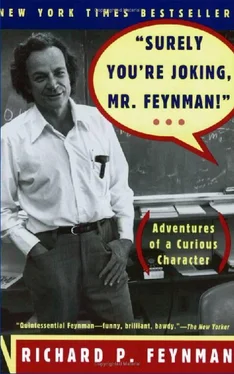All experiments in psychology are not of this type, however. For example, there have been many experiments running rats through all kinds of mazes, and so on—with little clear result. But in 1937 a man named Young did a very interesting one. He had a long corridor with doors all along one side where the rats came in, and doors along the other side where the food was. He wanted to see if he could train the rats to go in at the third door down from wherever he started them off. No. The rats went immediately to the door where the food had been the time before.
The question was, how did the rats know, because the corridor was so beautifully built and so uniform, that this was the same door as before? Obviously there was something about the door that was different from the other doors. So he painted the doors very carefully, arranging the textures on the faces of the doors exactly the same. Still the rats could tell. Then he thought maybe the rats were smelling the food, so he used chemicals to change the smell after each run. Still the rats could tell. Then he realized the rats might be able to tell by seeing the lights and the arrangement in the laboratory like any commonsense person. So he covered the corridor, and still the rats could tell.
He finally found that they could tell by the way the floor sounded when they ran over it. And he could only fix that by putting his corridor in sand. So he covered one after another of all possible clues and finally was able to fool the rats so that they had to learn to go in the third door. If he relaxed any of his conditions, the rats could tell.
Now, from a scientific standpoint, that is an A-number one experiment. That is the experiment that makes rat-running experiments sensible, because it uncovers the clues that the rat is really using—not what you think it’s using. And that is the experiment that tells exactly what conditions you have to use in order to be careful and control everything in an experiment with rat-running.
I looked into the subsequent history of this research. The next experiment, and the one after that, never referred to Mr. Young. They never used any of his criteria of putting the corridor on sand, or being very careful. They just went right on running rats in the same old way, and paid no attention to the great discoveries of Mr. Young, and his papers are not referred to, because he didn’t discover anything about the rats. In fact, he discovered all the things you have to do to discover something about rats. But not paying attention to experiments like that is a characteristic of cargo cult science.
Another example is the ESP experiments of Mr. Rhine, and other people. As various people have made criticisms—and they themselves have made criticisms of their own experiments—they improve the techniques so that the effects are smaller, and smaller, and smaller until they gradually disappear. All the parapsychologists are looking for some experiment that can be repeated—that you can do again and get the same effect—statistically, even. They run a million rats—no, it’s people this time—they do a lot of things and get a certain statistical effect. Next time they try it they don’t get it any more. And now you find a man saying that it is an irrelevant demand to expect a repeatable experiment. This is science?
This man also speaks about a new institution, in a talk in which he was resigning as Director of the Institute of Parapsychology. And, in telling people what to do next, he says that one of the things they have to do is be sure they only train students who have shown their ability to get PSI results to an acceptable extent—not to waste their time on those ambitious and interested students who get only chance results. It is very dangerous to have such a policy in teaching—to teach students only how to get certain results, rather than how to do an experiment with scientific integrity.
So I have just one wish for you—the good luck to be somewhere where you are free to maintain the kind of integrity I have described, and where you do not feel heed by a need to maintain your position in the organization, or financial support, or so on, to lose your integrity. May you have that freedom.
Adapted from a talk given in the First Annual Santa Barbara Lectures on Science and Society at the University of California at Santa Barbara in 1975. “Los Alamos from Below” was one of nine lectures in a series published as Reminiscences of Los Alamos, 1943—1945, edited by L. Badash et al., pp. 105—132. Copyright C 1980 by D. Reidel Publishing Company, Dordrecht, Holland.
When I was a young professor at Cornell, Professor Neugebauer had come one year to give a sequence of lectures, called the Messenger Lectures, on Babylonian mathematics. They were wonderful, Oppenheimer lectured the next year. I remember thinking to myself, “Wouldn’t it be nice to come, someday, and be able to give lectures like that!” Some years later, when I was refusing invitations to lecture at various places, I was invited to give the Messenger Lectures at Cornell. Of course I couldn’t refuse, because I had put that in my mind so I accepted an invitation to go over to Bob Wilson’s house for a weekend and we discussed various ideas. The result was a series of lectures called “The Character of Physical Law.”
While I was studying this table of corrections for the period of venus, I discovered a rare exaggeration by Mr. Thompson. He wrote that by looking at the table, you can deduce how the Mayans calculated the correct period of Venus—use this number four times and that difference once and you get an accuracy of one day in 4000 years, which is really quite remarkable, especially since the Mayans observed for only a few hundred years. Thompson happened to pick a combination which fit what he thought was the right period for ‘Venus, 583.92. But when you put in a more exact figure, something like 583.923, you find the Mayans were off by more. Of course, by choosing a different combination you can get the numbers in the table to give you 583.923 with the same remarkable accuracy!
Adapted from the Caltech commencement address given in 1974.












